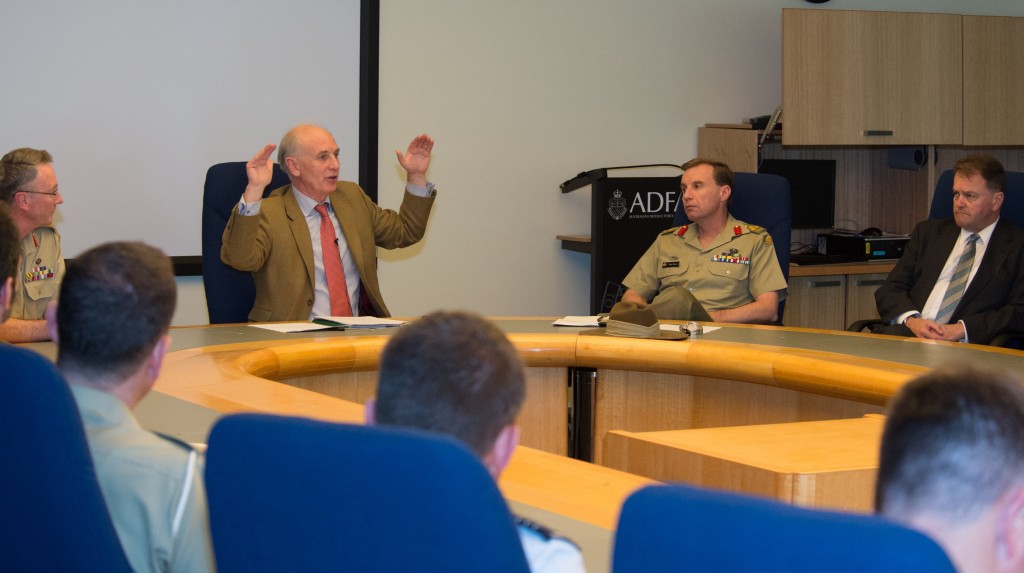The lost meaning of strategy
Posted By Brendan Taylor on May 14, 2014 @ 14:30
Strategy has long been a contested concept. Yet despite all of the debate surrounding the term, strategy ultimately concerns the relationship between military means and political ends. As the British strategist and military historian Basil Liddell Hart famously observed [2], strategy is ‘the art of distributing and applying military means to fulfil the ends of policy’.
Against this backdrop, there’s been some loose language thrown around on the pages of The Strategist over the last few days. Peter Jennings started us down this slippery slope when he asked ‘why DFAT doesn’t do strategy’ and implored the Government to task DFAT to develop ‘a strategic policy framework of the type associated with White Papers’.
Rob Ayson takes issue with Peter, contending that DFAT is already doing strategy.
His assertion is one I find somewhat troubling, however, because unless our diplomats have a few battalions hidden away in the bowels of ‘Gareth’s Gazebo’ the term ‘strategy’ applied to DFAT really is a misnomer. In answer to Peter’s question, DFAT doesn’t do strategy because it shouldn’t.
In this respect, I also disagree with Peter’s claim that ‘most strategy isn’t directed to the design and use of military force’. For as strategists going back to Clausewitz have observed, that military component is a defining characteristic of the term when used correctly.
Rod Lyon is equally untidy in his contribution when he seeks to circumvent what he terms an ‘arid debate’ about definitions of strategy by slipping straight into Walter Russell Mead’s definition of ‘grand strategy’. To be fair to Rod (and to Peter and Rob for that matter) there have been periods in history when definitions of strategy, grand strategy and even foreign policy have become synonymous. The classic case was the Cold War, where the all-consuming nature of the nuclear threat led to a conflation of those terms.
But in today’s world of much broader and more diffuse threats and challenges, strategy and grand strategy are no longer one and the same. Grand strategy is a much broader exercise involving the coordination of all of the resources that a nation state has at its disposal—economic, political, geographic, diplomatic, cultural and military—with a view to preserving and enhancing that state’s interests. To define ‘strategy’ in this way, however, deprives it of almost any meaning. Or as Richard Betts more colourfully puts it [3], it risks creating a situation where the ‘military core may become a pea lost in an amorphous ball of wax’.
It would be all too easy, of course, for Peter, Rob and Rod to dismiss these concerns as academic nitpicking of little relevance to ‘real world’ policymaking. On this point, the Oxford Professor Hew Strachan begs to differ. In his seminal Survival article, ‘The Lost Meaning of Strategy’ [4], Strachan cautions against the practical dangers in applying the term strategy too liberally. He points to the example of the so-called ‘War on Terror’, attributing the difficulties America faced in waging that campaign to a product of its failure ‘to relate means to aims (in a military sense) and to objectives (in a political sense)’. In his terms, ‘it abandoned strategy’.
Lest he be accused of anti-Americanism, Strachan is also critical of his own government, particularly the encroachment of its Defence Ministry into the realm of foreign policy and the government’s use of ‘the armed forces as their agents of peace as well as in war’. In his judgment, Britain no longer has ‘an identifiable government agency responsible for strategy (despite the Foreign Office’s apparent but perverse claim that that’s its task)’.
Given Australia’s own current preoccupation with ‘defence diplomacy’, could there be lessons in this for us perhaps? For at its most fundamental, strategy is about enabling the government to use force, if necessary, to achieve its political objectives. As Strachan notes, ‘strategy is not policy; it is not politics; it is not diplomacy’.
To use strategy interchangeably with such terms only invites incoherence. This is a dangerous path to go down. For as Professor Strachan concludes, ‘awesome military power requires concepts for the application of force that are robust because they are precise’.
Brendan Taylor is head of the Strategic and Defence Studies Centre at the Australian National University. Image courtesy of Department of Defence [5].
Article printed from The Strategist: https://www.aspistrategist.org.au
URL to article: https://www.aspistrategist.org.au/the-lost-meaning-of-strategy/
URLs in this post:
[1] Image: http://www.aspistrategist.org.au/wp-content/uploads/2014/05/Hew-Strachan-at-ADFA1.jpg
[2] famously observed: http://www.bookdepository.com/Strategy-Basil-Henry-Liddell-Hart/9780452010710
[3] more colourfully puts it: http://www.jstor.org/discover/10.2307/25054025?uid=3737536&uid=2129&uid=2&uid=70&uid=4&sid=21103759528461
[4] ‘The Lost Meaning of Strategy’: http://www.tandfonline.com/doi/abs/10.1080/00396330500248102#preview
[5] Department of Defence: http://images.defence.gov.au/20140325adfa3443327_0044.jpg
Click here to print.
